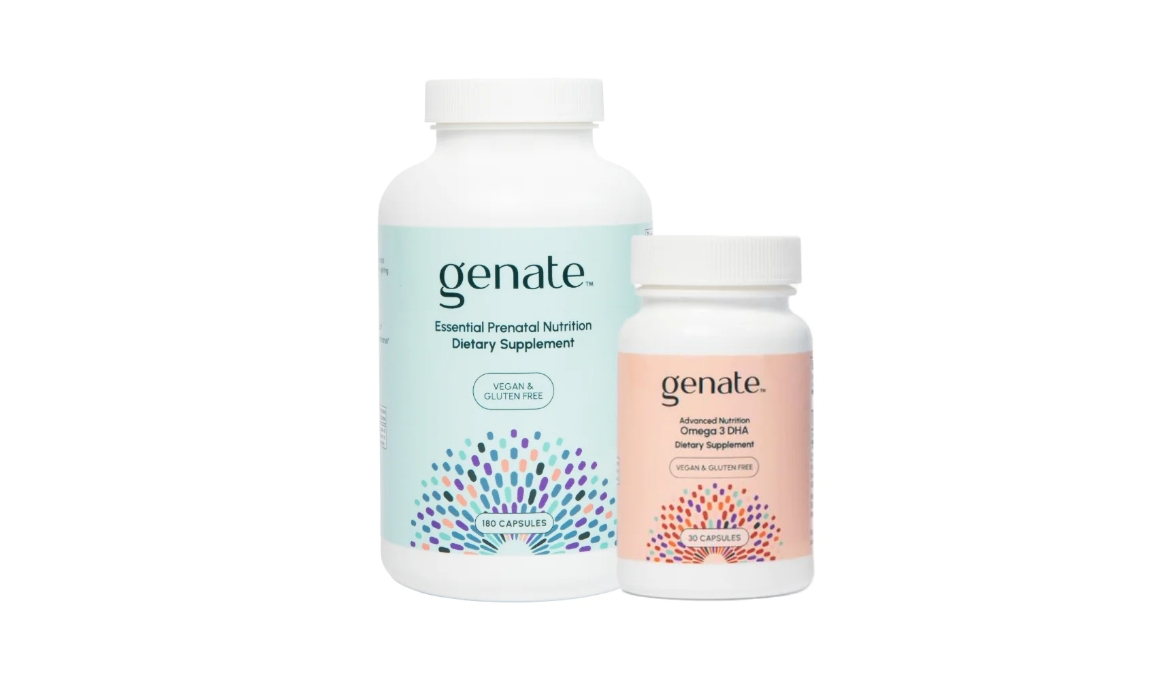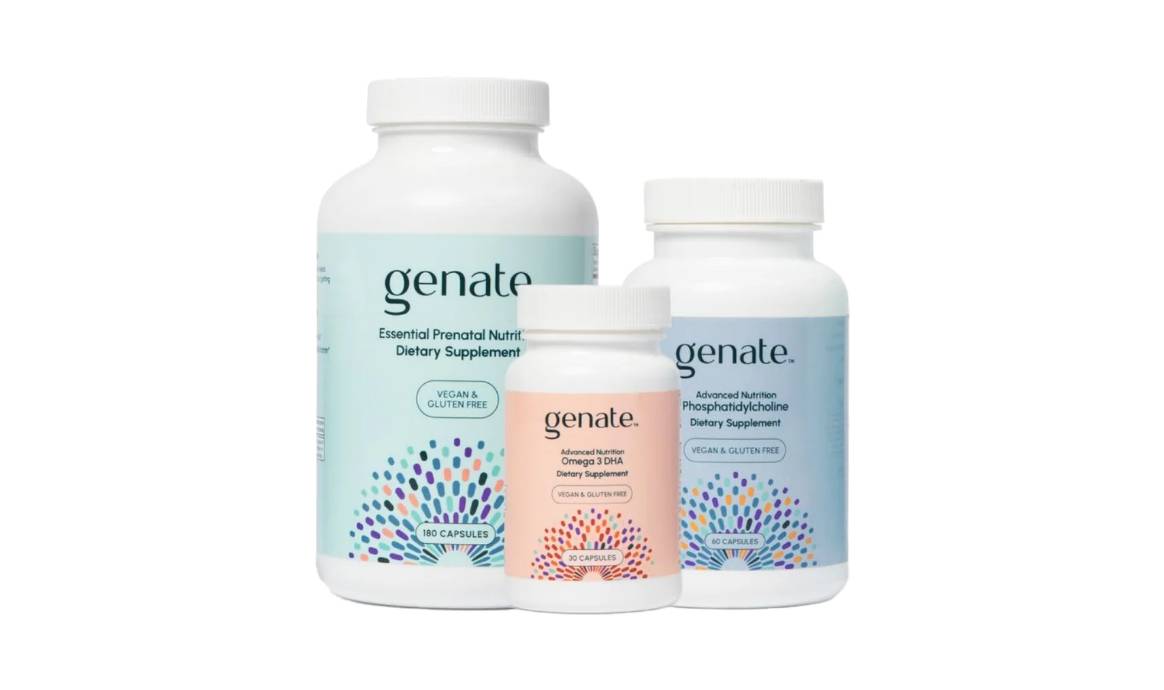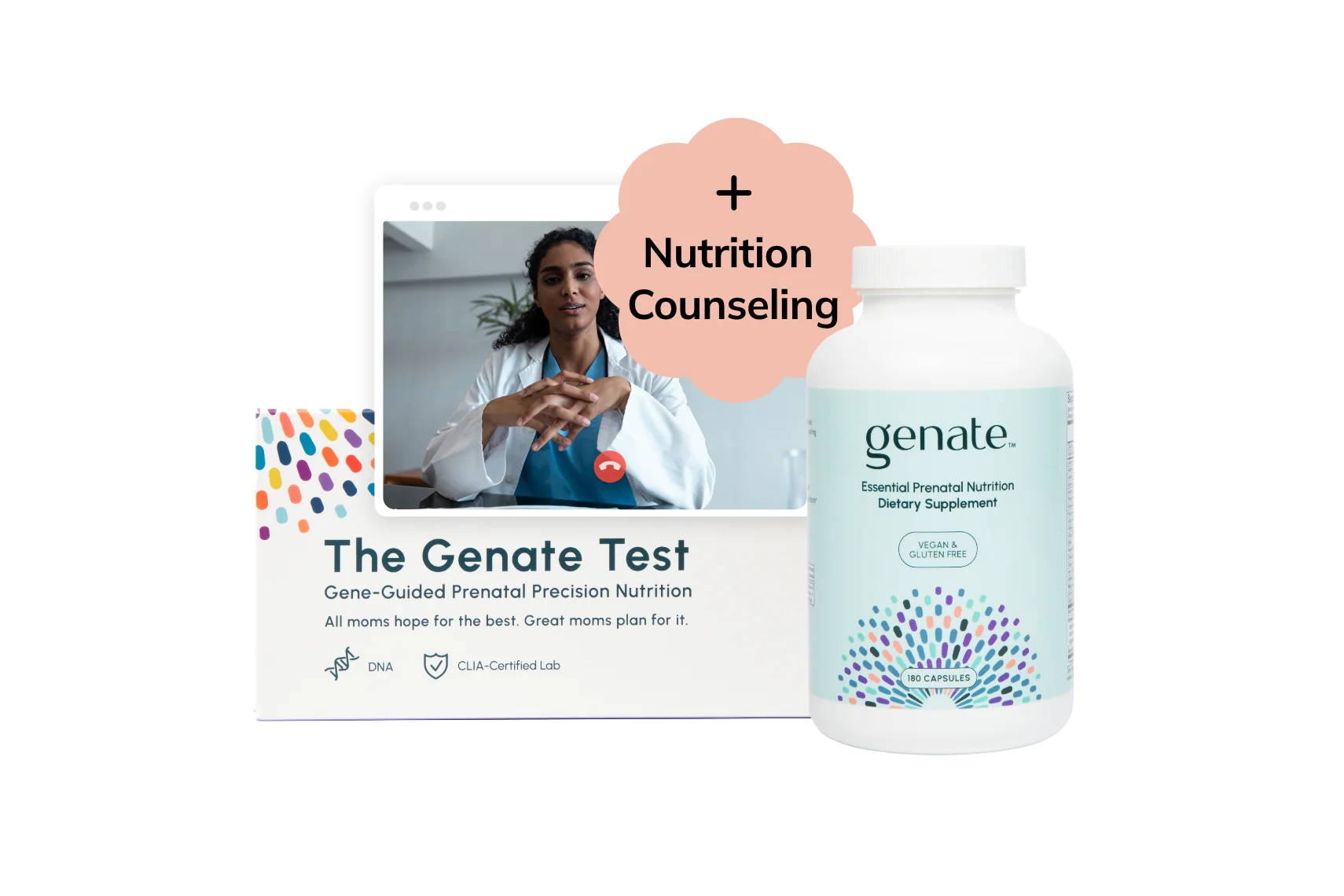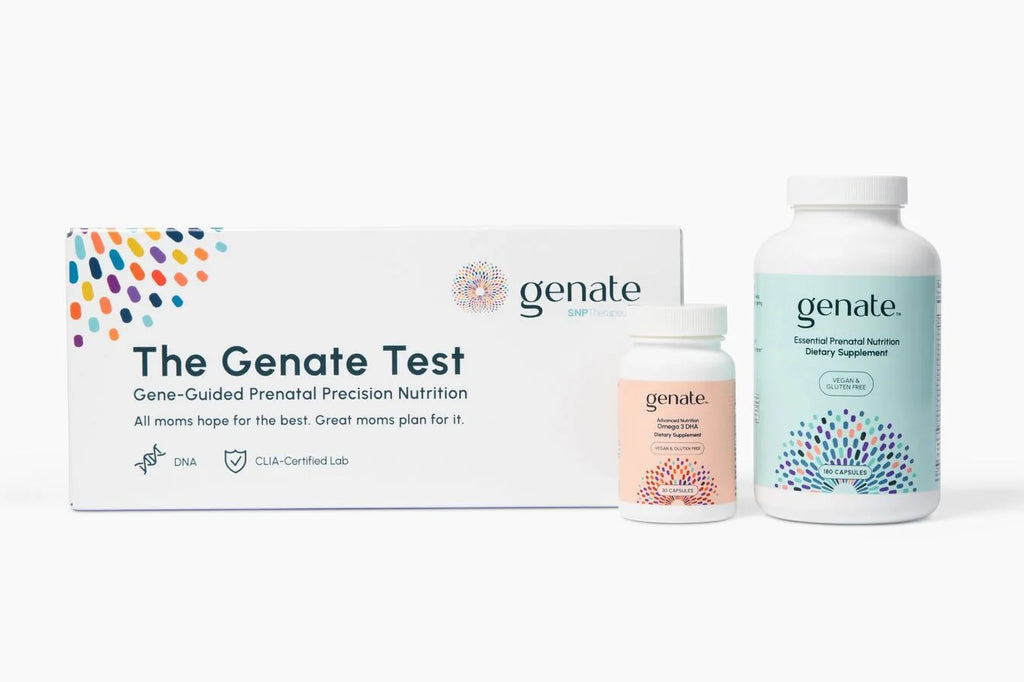Good nutrition is essential for every stage of your baby’s growth and development. But the efficiency with which your body metabolizes nutrients is partly determined by your genes, and common genetic variants can affect the metabolism of one-carbon nutrients that are critical for the development of your child’s brain and spinal cord. Genate Essential Prenatal Nutrition is a multivitamin formulated from academic research that provides women with a formulation optimized to support their baby’s cognitive development. It includes the one-carbon nutrients choline, betaine, methylfolate, and B vitamins that many women have trouble metabolizing and/or don’t get enough of in their diet.
PRENATALS
Folate vs. Folic Acid During Pregnancy: Which Should I Choose in My Prenatal?
by Cara Everett, MS, RDN, LDN • May 20, 2024 • 6-7 minute read
Key Takeaways
- Folate is critical for a healthy pregnancy and the formation of cells, DNA, and RNA.
- Folic acid supplementation is recommended by the CDC for all women of childbearing age to prevent neural tube defects in their babies.
- The genes that regulate folate metabolism affect how well each person can convert folic acid to the active form called methylfolate.
- The Genate Test evaluates the MTHFR and MTHFD1 genes in the folate pathway, along with a number of other genes that impact nutrient metabolism in pregnancy.
Folate vs. folic acid: What’s the difference?
Folate is a general term used to describe all forms of vitamin B9. It occurs naturally in foods such as leafy greens, legumes, and citrus fruits. Folic acid is the synthetic form of folate found in fortified foods and some supplements.[1] Folic acid is the preferred form to fortify foods because it is more stable to heat and light than natural folate. As a result, it does not break down in baked goods.
There is significant evidence that supplementation with folic acid effectively prevents neural tube defects, which are defects of the brain and spine that can form early in pregnancy. Although folic acid is stable and has been shown to be effective in clinical studies, it may not be the best form of vitamin B9 for you.
Genetic variants can have an impact on how well some women convert synthetic folic acid into methylfolate (5-MTHF), the active form of folate used by the body for important processes such as DNA methylation, cell division, and neural tube development.[2] Methylfolate is the form found in your blood, naturally occurring in foods, and added to some of the leading vegan prenatal vitamins.
Why is folate important in pregnancy?
Folate is a key player in many metabolic pathways in the body, all of which are critical for development in the earliest stages of life. It belongs to a group of compounds called one-carbon nutrients that donate methyl (or one-carbon) groups for the production of cells and genetic material.
Folate is needed for DNA and RNA formation, cell division, and neural tube development.
Its relevance is especially seen during pregnancy, when a baby’s body is growing rapidly. Both folate and another one-carbon nutrient called choline are necessary to prevent neural tube defects. The most critical time to get adequate amounts of folate is in the early weeks of gestation, but its importance does not end there. Folate is an essential factor for constructing DNA and cells for the fetus throughout pregnancy and the breastfeeding period.
When should you start taking a prenatal with folate?
The Centers for Disease Control and Prevention (CDC) recommends that all women of reproductive age consume 400 micrograms of folic acid per day, since neural tube defects can develop within three to four weeks after conception, when many pregnancies are yet to be discovered.[3]
Women who are trying to get pregnant should take a prenatal vitamin with 400 mcg of folate. Once you become pregnant, you’ll need 600 mcg folate per day.[1]
But knowing how effectively you metabolize folic acid is especially important if you’re trying to conceive. Researchers have uncovered a significant number of genetic variants that can impact how well your body converts folic acid into the active forms of folate needed for neural tube development and other processes.
What causes gene variants?
Gene variants are changes in the DNA sequence that can be passed down from a parent’s genetic code. Variants can also be caused by environmental factors, or simply by an error made when your body copies its DNA as new cells are made. Some variants cause changes in the way your body functions, while others have no impact at all.[4]
MTHFR and MTHD1 gene variants in pregnancy
Certain genetic changes can affect the way your body metabolizes nutrients, including folate. One type of gene variant is called a SNP (single nucleotide polymorphism). SNPs are misspellings in a person’s genetic code that may alter the way a gene functions, depending on where the SNP occurs in the DNA sequence. We see examples of this in variants commonly found in the MTHFR and MTHFD1 genes. These genes give the body instructions for transforming folic acid into methylfolate (5-MTHF) and other usable forms. When one or both copies of these genes has a variant, less methylfolate passes to your growing fetus to help with DNA, neural tube, and cell formation.
Up to 60% of women have a SNP in one of these genes, and approximately 25% of women have a SNP in both genes. A potential consequence of an MTHFR mutation is an accumulation of homocysteine. When combined with low folate levels, this has been linked to increased rates of miscarriage, preeclampsia, and congenital disabilities of the brain and spine.
Knowing if you have variants in the folate cycle and other related one-carbon nutrient pathways can help you address your genetically-related nutrition needs with changes to your diet and prenatal supplements.
How do I find an MTHFR gene mutation test?
You’ve come to the right place. The Genate Test is a prenatal genetic screening test that checks for variants in the MTHFR and MTHFD1 genes (along with a number of other genes) that can impact your folate metabolism.
What kind of folate is best?
Research is increasingly showing that the answer to that question depends on your genetics. The CDC states that people with most MTHFR variants absorb sufficient folic acid to prevent neural tube defects in their babies.[5] However, some studies show that supplementation with methylfolate is preferred for those with certain MTHFR variants.[1,6,7]
Additionally, there are other functional genes in the folate pathway, including MTHFD1. A person with multiple SNPs in each of these genes may want to add more folate-rich foods to their diet or choose supplements that include methylfolate. The Genate Essential Prenatal Multivitamin contains 600 mcg methylfolate to meet 100% of your folate requirement during pregnancy, in the form most easily metabolized.
Why is folate important in pregnancy?
Gene variants are changes in the DNA sequence that can be passed down from a parent’s genetic code. Variants can also be caused by environmental factors, or simply by an error made when your body copies its DNA as new cells are made. Some variants cause changes in the way your body functions, while others have no impact at all.[4]
The Genate Test
Using a prenatal genetic nutrition test can help expectant mothers understand how their genetics impact their nutrition and their developing baby’s health. Taking an MTHFR gene mutation test like the one from Genate can be done at home in just a few minutes. The Genate Test focuses on five metabolic pathways including:
- The folate pathway
- Methylation
- Fatty acid metabolism
- Phosphatidylcholine synthesis
- Choline metabolism
The test algorithm evaluates over 300 genetic variants to determine how your unique genetic profile affects the metabolism of nutrients essential for fetal growth and cognitive development. Your test results and nutrigenetic counseling by registered dietitians can help you make decisions regarding the form of folate that’s most appropriate for your unique genetic signature. In addition to helping you understand how your body metabolizes the one-carbon nutrients folate, omega-3 DHA, choline, betaine, and vitamin B12, it also reports on gene variants affecting calcium, iron, magnesium, riboflavin, vitamin A, C, D, K, and B6.
The bottom line
Certain SNPs in the MTHFR and MTHFD1 genes have been found to interfere with the conversion of folic acid to methylfolate. This can have lifelong effects for your health, as well as affecting the availability of folate for your developing baby.
Thankfully, medical technology has now made it easier than ever to find out if you have any genetic variants that are affecting your nutrient metabolism. With the information from your test, you can know for sure which form of folate you need and how to add it to your diet and supplement plan.
This article is not intended as medical advice to treat or diagnose any health condition but rather as educational health information for the general public. It should not be used as a substitute for individualized medical care from your healthcare provider.
Shop the Article
Save 23% today!
Genate Essential Prenatal Multivitamin + Advanced Omega-3 DHA Package
Bundle to increase savings and provide the foundational nutrients needed for optimal health and development.
From $72 per month
Save 23% today!
Comprehensive Prenatal Support Package
Genate Essential Prenatal Multivitamin + Advanced Omega-3 DHA + Phosphatidylcholine
Our most comprehensive bundle - you’ll receive our Essential Prenatal Multivitamin, Advanced Phosphatidylcholine, and Advanced Omega-3 DHA.
From $110 per month
Save 30% today!
Comprehensive Prenatal Nutrition Bundle
Buy the Genate Test and a nutrition counseling session with a Genate registered dietitian, and receive a 30-day supply of the Genate Essential Prenatal Multivitamin FREE. Purchase includes a 90-day prenatal multivitamin subscription at our best monthly price.
$309

Cara Everett, MS, RDN, LDN
Cara is a registered dietitian nutritionist with a passion for helping people optimize their health with sustainable diet and lifestyle changes. She provides nutrition counseling to clients of all ages, with specialties in nutrigenetics, women's health, and chronic medical conditions.
References
- National Institutes of Health. Folate. https://ods.od.nih.gov/factsheets/Folate-Consumer/ Published November 1, 2022. Accessed May 13, 2024.
- National Cancer Institute. L-methylfolate. Accessed May 13, 2024.
- Centers for Disease Control and Prevention. Folic acid. https://www.cdc.gov/ncbddd/folicacid/index.html Published December 20, 2022. Accessed May 13, 2024.
- Medline Plus. What is a gene variant and how do variants occur? https://medlineplus.gov/genetics/understanding/mutationsanddisorders/genemutation/ Updated March 25, 2021. Accessed May 13, 2024.
- Centers for Disease COntrol and Prevention. MTHFR gene, folic acid, and preventing neural tube defects. https://www.cdc.gov/ncbddd/folicacid/mthfr-gene-and-folic-acid.html Published June 15, 2022. Accessed May 13, 2024.
- Obeid R, Holzgreve W, Pietrzik K. Is 5-methyltetrahydrofolate an alternative to folic acid to prevent neural tube defects? J Perinatal Med 2013;41(5). https://doi.org/10.1515/jpm-2012-0256
- Vidmar GM, Šmid A, Karas KN, Trontelj J, Geršak K, Mlinarič-Raščan I. Folate insufficiency due to MTHFR deficiency is bypassed by 5-methyltetrahydrofolate. J Clin Med 2020;9(9):2836. https://doi.org/10.3390/jcm9092836
Take the Genate Quiz
Take our Nutrition Quiz to learn more about your nutrition journey.
Read Our Latest Articles
Frequently Asked Questions
What are the benefits of my baby getting the proper nutrients?
What are one-carbon nutrients and fatty acids, and why are they important?
One-carbon nutrients and fatty acids are critical for brain and spinal cord development during pregnancy and through the first two years of life. Although all nutrients are important, the one-carbon nutrients choline, folate, betaine, and B vitamins, along with the omega-3 fat DHA, provide the building blocks for proper growth of your developing baby's brain. Research at Cornell and Harvard universities has shown cognitive benefits for children born to mothers who received increased levels of one-carbon nutrients during pregnancy, demonstrating that optimal nutrition during pregnancy can have lasting effects for your baby.
If I buy Genate nutrition supplements, do I still need to take the test?
Genetic testing is a personal choice, and only you can decide what’s best for you and your baby. But the Genate Test is a powerful tool for optimizing your nutrition status, as it identifies genetically-caused metabolic inefficiencies that may influence your body’ ability to make and use the nutrients critical for your baby’s cognitive development. If you have SNPs in any of the nutrient pathways tested, your Genate Report will provide personalized recommendations for optimizing your nutrition. Our registered dietitians can show you how to fill in the gaps with foods and supplementation, if needed, to make sure you’re getting the nutrition you and your baby need.








